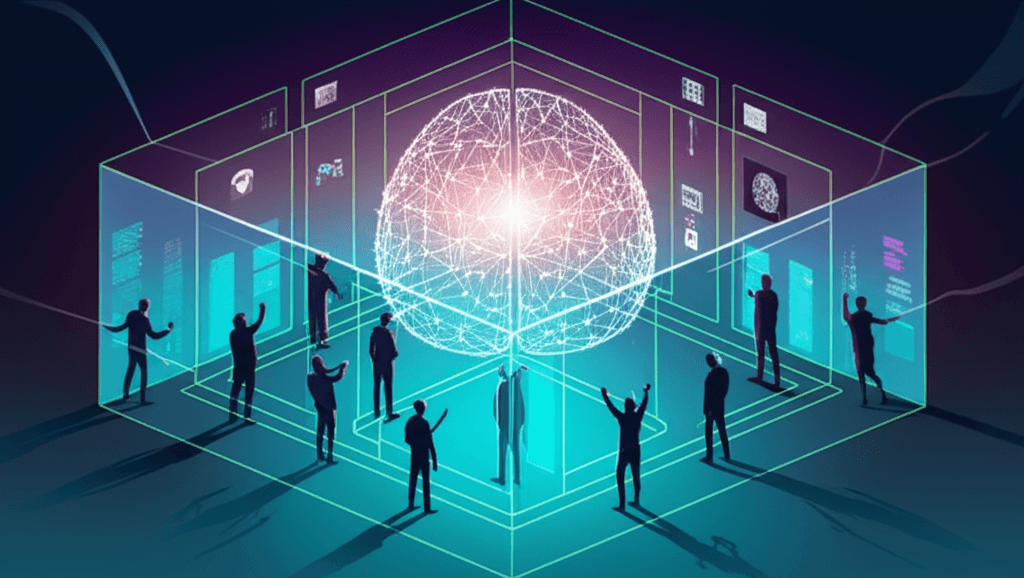OpenAI Locks Down Prized AI, Severely Limits Employee Access
OpenAI overhauls security, embracing "information tenting" and strict controls to protect its prized AI from escalating corporate espionage.
July 8, 2025

In an era where the most valuable corporate assets are not physical but digital, OpenAI, the creator of the widely recognized ChatGPT, is significantly enhancing its security protocols to safeguard its prized artificial intelligence algorithms. The San Francisco-based company has reportedly overhauled its security operations, implementing stringent restrictions on employee access to its most sensitive research and development projects. This strategic pivot towards heightened internal security underscores the escalating value of proprietary AI models and the growing threat of corporate espionage in a fiercely competitive global technology landscape. The new measures are a direct response to an evolving threat landscape that includes risks from both internal and external actors aiming to acquire the company's intellectual property.
The core of OpenAI's new security posture involves a policy insiders have termed "information tenting."[1][2] This approach compartmentalizes information, drastically limiting the number of personnel who have access to the development of new algorithms.[1] For instance, during the creation of the O1 model, discussions were reportedly confined to a select group of vetted team members.[2] This marks a significant shift from a previously more open internal culture. The company is also bolstering its physical and digital defenses. Access to certain rooms now requires fingerprint scans, and critical systems are being isolated on offline computers.[2] Furthermore, OpenAI has instituted a "deny-by-default egress policy," meaning no internet connections are permitted unless explicitly authorized, a move designed to prevent data exfiltration.[1] These security enhancements are not just procedural; they are part of a broader strategy that has seen the company restructure its internal "Insider Risk Team," which is tasked with protecting the highly valuable model weights that are the foundation of its generative AI.[3]
The impetus for this security overhaul appears to be multifaceted, driven by both specific incidents and general industry trends. A significant catalyst was reportedly the emergence of the Chinese AI startup DeepSeek.[1][2] OpenAI suspected that DeepSeek had utilized a technique known as distillation, which involves using the outputs of a more powerful model to train a smaller one, to copy its models.[1] OpenAI stated it had seen "some evidence of distillation."[1] This incident highlights the broader challenge of protecting AI trade secrets, which, unlike patented inventions, are protected only as long as they remain confidential.[4][5] The high-stakes competition for AI dominance has created a fertile ground for corporate espionage, where a single stolen algorithm could be worth billions and confer a significant market advantage.[6][7] The landscape is further complicated by the fact that AI itself can be used as a tool for espionage, capable of analyzing vast datasets to uncover and exploit vulnerabilities.[8][9][7]
The implications of OpenAI's move toward greater secrecy are significant and could ripple throughout the AI industry. Internally, the new restrictions may alter the collaborative and open research environment that has been a hallmark of many leading AI labs. While necessary for security, such measures could potentially stifle the cross-pollination of ideas that often leads to breakthroughs. Moreover, in a tight labor market for top AI talent, overly restrictive policies could become a hurdle for recruitment and retention. For the wider industry, OpenAI's actions could signal a broader trend away from openness and toward a more guarded approach to research and development. This shift is already evident in the company's move toward patent protection for its technologies, a departure from its historical reliance on trade secrets.[4] The need for enhanced security is also underscored by a 2023 incident where a hacker gained access to internal OpenAI messaging systems and stole design details, although not the core AI models themselves.[10][11]
In conclusion, OpenAI's decision to severely limit employee access to its top AI algorithms is a telling sign of the maturation and increasing valuation of artificial intelligence technology. Faced with credible threats of corporate espionage and intellectual property theft, the company is trading some of its traditional research openness for a more fortified, secure development process.[1][2] This move reflects a calculated response to a new reality where the blueprints for the next generation of AI are among the most sought-after secrets in the world. The long-term effects on innovation, company culture, and the collaborative spirit of the AI community remain to be seen, but it is clear that the days of unguarded development are over. As AI's economic and strategic importance continues to soar, the tension between the need for secrecy and the benefits of openness will likely become a defining characteristic of the industry.
Sources
[2]
[4]
[6]
[7]
[9]
[10]
[11]